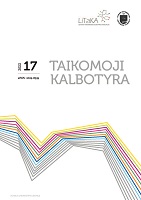Slaviškos kilmės veiksmažodžiai su priesagomis -inti, -uoti, -yti, -ėti, -auti lietuvių kalbos žargone: derivaciniai ir adaptaciniai hibridai
Hybrid verbs of Slavic origin with the suffixes -inti, -yti, -uoti, -ėti, -auti in Lithuanian slang: derivative and adaptive hybrids
Author(s): Robertas KudirkaSubject(s): Morphology, Syntax, Comparative Linguistics, Sociolinguistics, Phraseology
Published by: Vilniaus Universiteto Leidykla
Keywords: verbal borrowings; morphological adaptation; verbal derivation; slang;
Summary/Abstract: The article analyses 246 hybrid verbs of Slavic origin with the suffixes -inti, -uoti, -yti, -ėti, -auti from the Lithuanian slang and non-standard dictionary. The study reveals that borrowings with affixal adaptation are always adapted to the linguistic system. The most popular suffix is -inti (190 hybrid verbs). There are some (64) derivative hybrids with this suffix, hybrids are formed from the adapted basic words, and therefore, in such cases hybrid verbs are derivations of the suffix -inti. There are twice as many adaptive hybrids (126), which are morphologically adapted by replacing the derivative suffix of the language donor with the suffix of the language recipient. Other suffixes are rare: -uoti (21), -yti (12), -ėti (12), -auti (11), with which derivative hybrids are usually formed from already adapted basic noun in slang.
Journal: Taikomoji kalbotyra
- Issue Year: 2022
- Issue No: 17
- Page Range: 62-78
- Page Count: 17
- Language: Lithuanian

